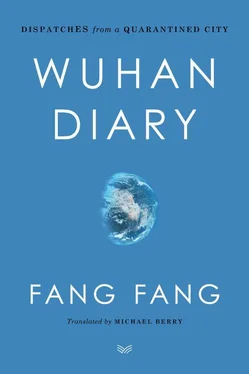On January 24, 2020, Hubei Daily reporter Zhang Ouya went to his Weibo social media account to call for the political leaders of Wuhan to be replaced with stronger leaders, like those who led the fight against SARS in Beijing during 2003. Zhang’s employer, Hubei Daily , issued a swift apology to various government bodies for the post.
Zhang Guangnian (1913–2002), also known as Guang Weiran, was a Chinese poet and military leader. He joined the Chinese Communist Party in 1929. He wrote the poem that would become the basis for the lyrics of the Yellow River Cantata ( Huanghe dahechang ) in 1939. He also served as editor of People’s Literature ( Renmin wenxue ).
Dai Jianye (b. 1956) is a professor of Traditional Chinese Literature at Huazhong Normal University. He is the author and editor of numerous books, including Laozi’s Philosophy of Life ( Laozi de rensheng zhexue ), and a popular columnist. On February 26, 2020, he published an essay supporting Fang Fang entitled “Shouldn’t Old Men Like Us Feel at Least a Little Bit Ashamed When Facing Fang Fang?” (“Miandui Fang Fang, women zhexie yemen nandao jiu meiyou yidian kuiyi?”); the essay was later removed from the internet.
Zhu Rongji (b. 1928) is a veteran Chinese politician who previously served as premier of the People’s Republic of China from 1998 to 2003. Previous to his term as premier he had served as first vice premier. During his time in office, Zhu oversaw expansive economic growth. He retired in 2004.
Yi Zhongtian (b. 1947) is a Chinese writer, academic, and historian. He is a professor of Chinese Language and Literature at Xiamen University and has published widely in the fields of literature, art, aesthetics, and history. He is the author of numerous books and also well known for hosting several popular talk shows and documentaries.
Here the author is quoting the first lines of the poem “Son of the River Town” (“Jiangcheng zi”) by the Song poet Liu Chenweng (1232–1297).
In the original Chinese edition of Wuhan Diary , all entries from January 25 through February 29 are dated using the lunar calendar. Starting March 1, entries use the Western calendar for dating. At the author’s suggestion, this edition exclusively employs dates from the latter calendar.
Jiang Xueqing (1964–2020) was a highly commended doctor at Wuhan Central Hospital who specialized in thyroid and breast cancer. He also held various administrative and leadership roles within the hospital.
“Positive energy” ( zheng nengliang ) is here referencing a political term coined by the General Secretary of the Communist Party of China, Xi Jinping, in 2012. It is usually referred to as discourse that is “politically correct” and aligns with the views and policies of the Chinese Communist Party. Public discourse that challenges or goes against the party line is referred to as “negative energy” ( fu nengliang ).
Water Beneath Time ( Shui zai shijian zhi xia ) is a 2008 award-winning novel by Fang Fang. The novel begins in 1920 and follows the life of a Han opera singer in Hankou, tracing the tales of love and violence that follow her life.
For more on Wuhan’s three-town structure, please see Fang Fang’s essay “This Place Called Wuhan,” in the back of this book.
Zhou Enlai (1898–1976) was the first premier of the People’s Republic of China, serving from 1949–1976. Zhou played an important role in the history of the Chinese Communist Party from 1921 all the way up until his death. He was known for his diplomacy, especially for his tenure as foreign minister, 1949–1958.
Alternately referred to as “Melancholy approaches and I hear the demons howl” or “I raise my eyebrows as swords begin to melt,” this is a poem written by Wang Lishan in April 1976 to commemorate Zhou Enlai. The poem was widely disseminated in 1976 during the April 5th Movement before being criticized and suppressed. In 1978 the April 5th movement was officially redressed by the government.
Yu Luoke (1942–1970) was an apprentice worker at the Beijing People’s Machinery Factory when he wrote a series of essays on the topic of “bloodlines.” His best-known essay, “On Bloodlines” (“Chushen lun”), was intensely debated at its time of publication. Yu Luoke was arrested in 1968 and executed in 1970. His fate would go on to become widely associated with the violence of the Cultural Revolution.
Han Dong (b. 1961) is a poet, novelist, and filmmaker based in Nanjing. He is the author of the novel Banished (2003) and the poetry collection A Phone Call from Dalian (2012). He is also the director of the film One Night on the Wharf (2017).
Feng Tianyu (b. 1942) is a professor at Wuhan University specializing in Chinese Cultural History. He is vice president of the Chinese Shixue Society and the author of numerous books, including Probing into Neologism, Yuehua Collection , and Outline of Chinese Cultural History .
Yuen Kwok-Yung (b. 1956) is a Hong Kong–based microbiologist, doctor, and surgeon. He serves as a fellow of the Royal College of Physicians and is a specialist in novel microbes in emerging infectious diseases. He has been a vocal figure in the fight against COVID-19, advocating for the effectiveness of face masks and educating the public on the virus.
The first cases of the novel coronavirus outside China were reported in Thailand on January 13, 2020.
“In Deploying Preventive Measures Against the Infectious Novel Coronavirus, the National Health Commission Holds a Nation-wide Tele-Conference” (“Guojia weisheng jiankangwei zhaokai quanguo dianshi dianhua huiyi bushu xinxing guanzhuang bingdu ganran feiyan fangkong gongzuo”) published online by the National Health Commission of the People’s Republic of China on January 14, 2020. http://www.nhc.gov.cn/xcs/fkdt/202002/e5e8a132ef8b42d484e6df53d4d110c1.shtml.
Ai Fen is a physician and director of the Emergency Department at Central Hospital in Wuhan. She is credited as the first doctor to disclose information about the novel coronavirus outbreak in Wuhan after treating patients on December 18 and December 27 who exhibited SARS-like symptoms. She has been referred to as the “whistle-giver” since it was her photos and reports that reached Li Wenliang, who later became known as one of the “whistleblowers.”
The article about Ai Fen and the firsthand account she wrote were published in People ( Renwu ) o n March 10, 2020. The report was removed from the internet by censors three hours after it had been uploaded.
This is a self-reflective poem attributed to the Abbot of the Lingyin Temple in Hangzhou, Master Huiyuan (1103–1176). Huiyuan lived during the Song Dynasty and his successor was the famous monk Ji Gong (1130–1207).
Yan Geling (b. 1958) is a well-known Chinese-American writer and screenwriter currently living in Berlin. She is the author of numerous novels, including The Banquet Bug, The Lost Daughter of Happiness, and Little Aunt Crane . Her fiction has also been adapted into numerous television miniseries and feature films by top directors like Feng Xiaogang, Zhang Yimou, and Joan Chen.
Читать дальше



![О Генри - Закупщик из Кактус-Сити [The Buyer from Cactus City]](/books/405348/o-genri-zakupchik-iz-kaktus-thumb.webp)








